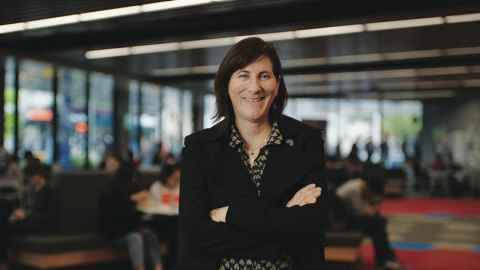Meet our Mars researcher
6 December 2018
Geologist, paleoecologist and astrobiologist Professor Kathleen Campbell has set herself a big challenge: investigating the origins of life on Earth, and asking whether life might exist on other planets.

Now the former NASA researcher has found the perfect place to continue her work – New Zealand. Kathleen chooses to research and teach in New Zealand because of its “incredible outlook on the world” and spirit of collaboration which make it the perfect place to search for the answers to some of the biggest questions in science.
A professor in the University of Auckland’s School of Environment, US-born Kathleen is a world-renowned specialist in extreme environments and uses her research to help search for life on other planets. The work includes being part of an international team vetting possible landing sites for the NASA Mars 2020 mission.
Kathleen had been working in US space agency NASA when she came for a three-year stint in New Zealand. She’s still here, 21 years later. “It’s the perfect environment for dynamic and active research, and that's what's kept me here,” Kathleen says. “We have a lot of collaboration and fantastic ties around the world, so students get access to top scientists and top instruments.”
I’ve found I have better access to international collaborators because of New Zealand's outlook. I really feel like it has advantaged me as well as my students.
She also values New Zealand for its flexibility, its beauty and its extreme geological environments, which are perfect for her research. New Zealand is an open, free society with strong local and global connections, which have also been useful in Kathleen’s work.
The University of Auckland’s relationships with the local Māori people and the Department of Conservation have enabled Kathleen and her students to have “unprecedented access” to New Zealand’s unique thermal hot springs area of Rotorua in the centre of the North Island that they’re studying for their Rotorua on Mars project.
Rotorua on Mars is funded by the university to help promote the use of hot springs in the search for life on other planets. One of the students involved is BSc Honours student Sian Camp, who is exploring the relationship between microbes and the Rotorua hot springs they live in to help us understand what might have happened on Mars.
“Kathleen really encourages me to get out of my comfort zone and develop new skills,” says Sian. “Rather than always explaining things to me, she asks me what I think first. She pushes me, and it’s a really good thing, because it teaches me how to make it on my own.” Sian’s research will be directly used to help choose a landing site for the NASA Mars 2020 mission.
Kathleen’s role at the university includes directing Te Ao Mārama, the Centre for Fundamental Inquiry. The centre is about “looking for life in the universe, the evolution of the universe, and the evolution of life”, she says. “What's so exciting is that students are involved, all the way down to first year undergraduates. They're involved with conferences, field trips and meeting international scientists from around the world who come and work with us. It's a very exciting mix of different kinds of people coming together to try to solve some of the big questions.”
Years of experience as a researcher and teacher have taught Kathleen that solving challenging problems requires collaboration and teamwork. “Different skill sets, people with different personalities and different world views – you've got to bring them together for big problem-solving,” she says. “Students help each other out in their different field areas, and we come up with different ideas. The students sometimes solve a problem I can't solve. We all work together.”
“Kathleen teaches me techniques for my field work and lab analysis, but encourages me to use my own criteria,” says Diana Pajuelo, a student from Peru. “She doesn’t tell me what to do, she just guides me.”
Diana believes the skills she has learned from studying with Kathleen in New Zealand will be very helpful in her future career, something Kathleen has seen with many past graduates. “They need the ability to go out on their own, do some work, come back, interact with us, and then go back out and run with it,” says Kathleen. “There are many career positions where you can apply these skills, and I really want my students to have that expanse of outlook when they go out into the world.”
Media queries
Kirsten Brown | International Communications
Email: kirsten.brown@auckland.ac.nz
Original article by Linley Boniface. Reproduced with permission from Education New Zealand.